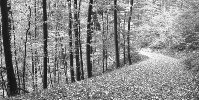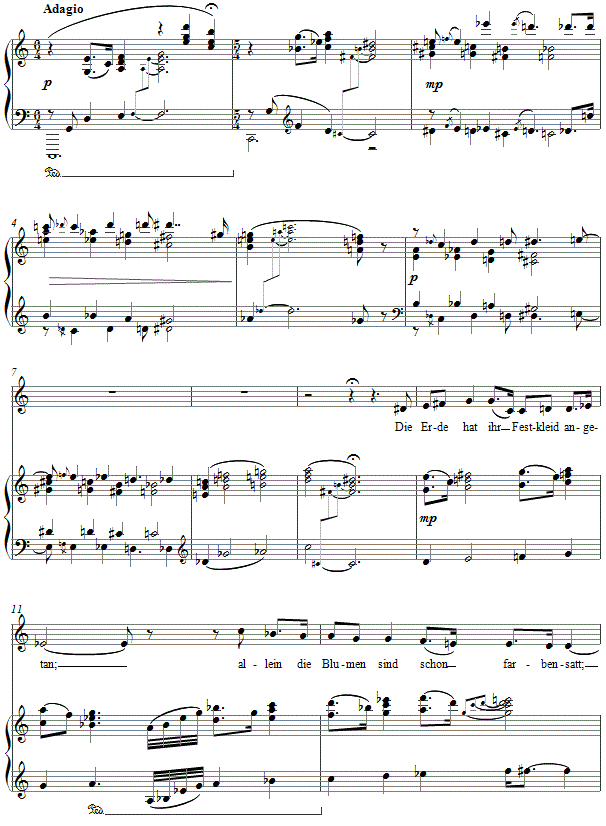Music and Texts of GARY BACHLUND
Vocal Music | Piano | Organ | Chamber Music | Orchestral | Articles and Commentary | Poems and Stories | Miscellany | FAQs
Herbst - (2012)
text of Bertram Kottmann after a poem by Albert Laighton
for medium voice and piano
Die Erde hat ihr Festkleid angetan;
allein die Blumen sind schon farbensatt;
das Meer wogt blauer; an der Abendsonne Bahn
errichten Engel ihre lichte Lagerstatt.
Die fernen Höhen krönt ein Purpurdunst;
die Tage sanft, und lang und still die Nacht,
erstaunten Augen zeigt sich, wie durch Zauberkunst,
des Nordlichts wandelbare Pracht.
Natur teilt Ihre Gaben aus mit milder Hand,
und auf den Feldern Garb' an Garbe steht;
indes im Wald, von Herbstesrauschen übermannt,
ein Zittern durchs erglühte Laub des Ahorns geht.Copyright © Bertram Kottmann 2012 All international rights reserved. Used with permission
4 pages, circa 3' 30"
As with Kottmann's Blumen and as I read it, this reinterpretation of a poem in English is too fine to warrant being called only a translation. Rather I conclude that it carries its own additional values and is therefore original while based closely on Laighton's work. This view may not be acceptable to all, but it is certainly mine to hold.
The original English poem by American poet, Albert Laighton (1829-1887) has been reinterpreted by Bertram Kottmann, who has provided many translations between German and English, some of which may be read on the Lieder and Art Songs website, to which he is a contributor. What follows is Laighton's evocative Autumn.
The world puts on its robes of glory now;
The very flowers are tinged with deeper dyes;
The waves are bluer, and the angels pitch
Their shining tents along the sunset skies.
The distant hills are crowned with purple mist;
The days are mellow, and the long, calm nights,
To wondering eyes like weird magicians show
The shifting splendors of the Northern Lights.
The generous earth spreads out her fruitful stores,
And all the fields are decked with ripened sheaves;
While in the woods, at Autumn's rustling step,
The maples blush through all their trembling leaves.
The dense, colorful chromaticism precludes a key signature, though the setting come to rest repeatedly on D. Rising and falling gestures surround a half-step movement, as non-harmonic chords function as punctuations. The form is strophic, the last verse being more fully rooted on D until the final, major seven cadence.
The score for Herbst is available as a free PDF download, though any major commercial performance or recording of the work is prohibited without prior arrangement with the composer. Click on the graphic below for this piano-vocal score.

